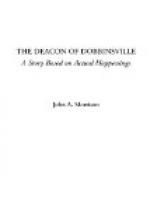As Harry Benton thus spoke his wife and children listened intently, and when the meal was finished and the Bible was brought for the morning worship, the whole family was in a serious frame of mind. Benton went on to say, “And when we talk of home scenes, I always think of father and his godly influence upon my life. As I look across the years, I see myself an ignorant awkward country boy; but there is one thing for which I shall always thank my God, and that is that I was blessed with a Christian father. Throughout the years his saintly life has been a benediction to me. The most sacred picture that hangs on the wall of my memory is that of my father with the big family Bible on his lap and all the children gathered around him and Mother for the worship of his God. Well do I remember when he used to pray for us, naming us out one by one and asking God to make us useful men and women. And oh, how he used to be persecuted by the Mount Olivet people. Well do I remember how one morning when Father was on his way to milk your father’s cows he was met by Deacon Gramps, who beat him so shamefully. That night in family worship Father prayed so fervently and asked God to forgive Gramps and save him from his wicked ways. The impressions I received during those stirring days never will leave me. I tell you, Eva, it meant something for Father to stand true as he did, and I think heaven will be especially sweet to those who have suffered as he has suffered.”
When he had left off speaking and the family knelt in prayer, Harry Benton’s voice trembled with emotion as he prayed for all those back home whom he remembered, and especially for his father.
When the morning chores were done and Harry Benton started to the Full Salvation Mission, which mission he had superintended and supported for a number of years, he was met on his front porch by a Western Union messenger boy, who took from beneath his blue cap a slip of yellow paper and handed it to him. This is how it read: “Come, Father very low.”
Benton telephoned one of his brethren to take charge of the Mission, and after earnestly beseeching the Lord to spare his father until his bedside could be reached, he and his wife made hasty arrangements to start, and were soon speeding across the fertile fields of Illinois. They crossed the mighty Mississippi, changed trains in St. Louis’ big Union Depot, and after a few hours’ ride their train was gliding past old familiar scenes of bygone days.
“Dobbinsville, Dobbinsville,” shouted the porter as he thrust his face in at the door of the coach. Three short jerks at the signal cord—swish, swish, swish—back from the engine—t-oot-oot-oot—a sudden let-up in speed, a screech of the airbrakes, a bang of the door, and the Texas Canon-Ball made one of its seldom stops at Dobbinsville and Harry Benton and his family stepped to the platform.




